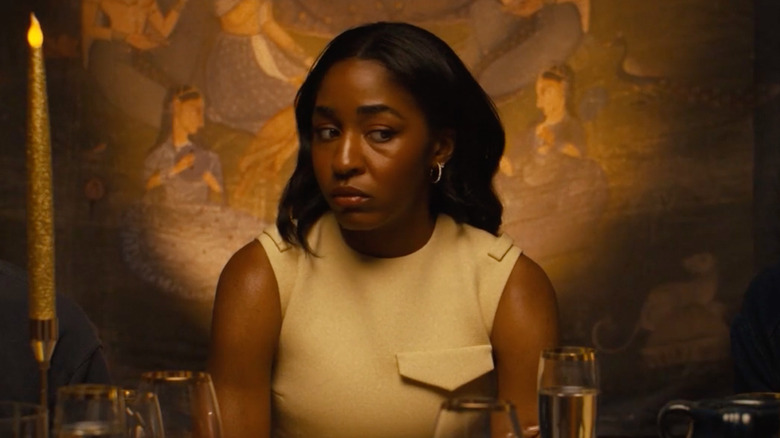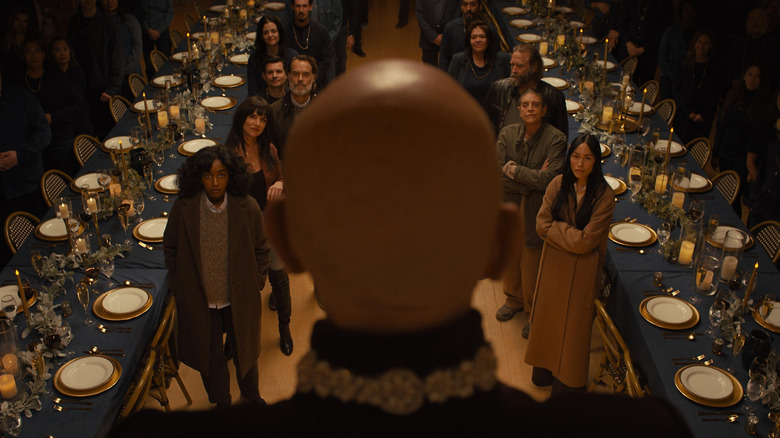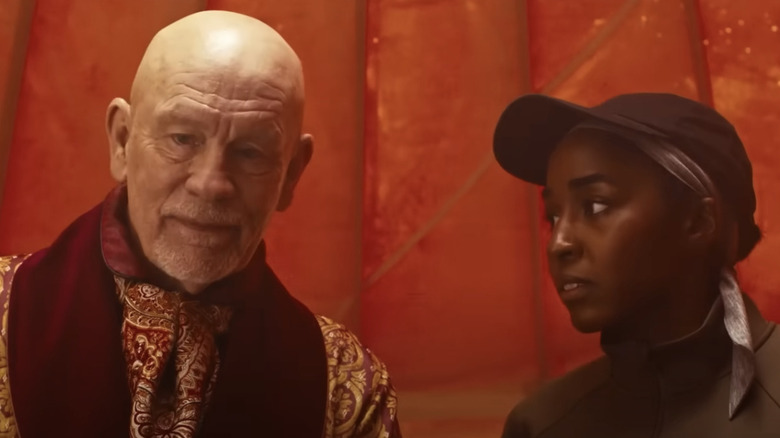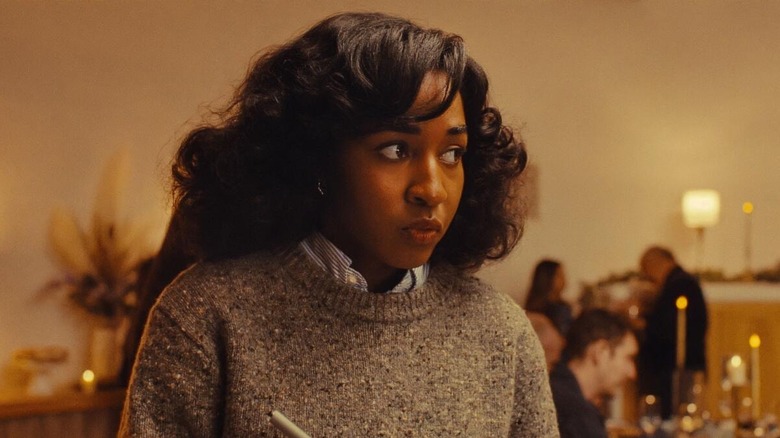Opus Review: This Cult Horror Comedy Is Too Familiar For Its Own Good [Sundance]
Back during the 2000s, there was a wave of horror movies and thrillers that were known for their big twists. In the wake of buzzy '90s megahits like "Se7en" and "The Sixth Sense," many filmmakers sought to chase the wave of word-of-mouth around constructing a tale that contained a massive plot twist at or near the finale. While third-act plot twists were by no means a new thing — the works of 19th century author O. Henry popularized the technique so much that it bore his name for a while, and Rod Serling and his writers continued that tradition during "The Twilight Zone" — they certainly became enough of a fad that, in my view, there were multiple variations on the last minute twist. There was the expertly constructed twist (as seen in those aforementioned examples along with "Fight Club" and "Saw"), which only served to expand the story you thought you had been following. Then there was the shock value twist (aka the "it was all a dream" reveal), which essentially negated everything that had come before it and put the story into a completely unexpected context.
One of the most intriguing elements of "Opus," the debut film from former GQ journalist Mark Anthony Green, is its most frustrating: it's a twist movie that straddles the line between these two techniques. Like the expertly constructed twist movies of yore, it has an incredibly clever construction that comes into full bloom once all the proverbial cards are on the table. But you're not getting the full picture until the very end, which leaves sitting through the bulk of the film on a first-time viewing notably unsatisfying. Because of this, "Opus" is a film that only becomes engaging in retrospect, which leaves recommending it a dubious proposition.
Opus feels too obvious
If "Opus" had been released a decade ago, it might be easier to praise it for its originality and depth when it comes to building a discussion around celebrity worship (and its relationship to cult behavior), and for turning horror movie tropes on their head. Sadly, it's being released at the tail end of a wave of thrillers which all follow the basic structure: eccentric wealthy person and/or celebrity invites a select few to join them at a remote location, whereupon their devious and murderous secret plans are enacted. "Glass Onion," "Blink Twice," a bit of "Midsommar," and especially "The Menu" are all recent examples that "Opus" recalls somewhat haphazardly, and the comparisons don't do it many favors. Sure, being part of a trend or subgenre in cinema doesn't automatically disqualify a film — there's enough room for "Armageddon" and "Deep Impact," in other words — but the issue is that "Opus" holds its cards too close to the chest for too long, losing viewers before it has a chance to spring a legitimately compelling twist on them.
"Opus" introduces a fictional mega-popstar, Alfred Moretti (John Malkovich), who made a massive impact on the industry and the culture 30 years earlier before unceremoniously disappearing from the public eye. Suddenly, he's back with a big new album entitled "Caesar's Request," and in very Agatha Christie fashion, he's invited only a few people to come out to the middle of nowhere in Utah, where his compound resides, and listen to the album first. These not-so-lucky guests are a paparazzo, Bianca (Melissa Chambers), a former rock star rival of Alfred's, Bill (Mark Sivertsen), a social media influencer, Emily (Stephanie Suganami), a TV personality, Clara (Juliette Lewis), and the editor of a music publication, Stan (Murray Bartlett). In very "Willy Wonka" style, however, Alfred also invites one of Stan's employees, the young and ambitious (but still unknown) journalist, Ariel Ecton (Ayo Edebiri). Her invite is something that everyone assumes to be some act of charity on the star's part, especially Stan, who insists that he'll be the only one to write the final pieces about their time at Alfred's compound.
Sure enough, it's Ariel who begins to poke around the mysteries surrounding Alfred, his new album, his relationship with a cult organization called the Levelists, and why every invitee is intensely monitored and shadowed by a Levelist aide. Things eventually get dangerous and violent, but the big issue is that when they do, it's still unclear why. Those answers do come, but for some it'll be too late, and I can't blame them — slasher films work best when some set of stakes and rules are established, even when they're going to be changed later, and "Opus" is too obtuse for too long.
Ayo Edebiri, John Malkovich, and the music are the main reasons to see Opus without caveat
"Opus" doesn't have the right amount of tension, scares, outrageousness or suspense to sustain itself throughout its runtime, with even the ensemble cast feeling underused. While films like "Blink Twice" and "The Menu" feature fabulous ensemble casts full of character actors making a meal out of their roles, "Opus" doesn't quite let the spotlight shine on everyone — it's delightful to see Tony Hale turn up for a couple scenes as Alfred's manager, but he's mostly out of the picture too quickly, and a great actress like Amber Midthunder is almost wasted playing a silent role as Ariel's Levelist monitor (after "Prey," Midthunder should be given more huge opportunities, not less). The ensemble nature of "Opus" is uneven, with even reliably idiosyncratic performers like Lewis feeling relegated to the background.
Fortunately, Green does right by his two leads, with Edebiri and Malkovich given ample space and material to make a meal out of their characters. Both actors are prime casting for the type of satire "Opus" wants to be (and, after a fashion, is — more on that later), and it's a genuine pleasure to see an actress as singular as Edebiri play around with the tropes of the Final Girl. Edebiri gives Ariel a perfect blend of strength and vulnerability; where some actresses are forced to transform their characters into a Warrior Woman type by the third act of many a slasher movie, Edebiri keeps Ariel believable as the same character throughout, allowing her to be the type of woman who wears a "The King of Limbs"-era Radiohead t-shirt during the last act that feels appropriate to her character and not something put-upon by the director or costume designer.
Malkovich, that performer so oozing with a special mixture of intensity and ambiguous dynamism, leans into his role with all the gusto you'd hope. He's played so many erudite and menacing characters throughout his career that it's honestly impressive he's able to find new notes for such a role, and he's undoubtedly helped by the fact that in "Opus," he's been given those new notes, literally. The film's original songs for Alfred were written by Nile Rodgers and The-Dream, with Malkovich in mind. As a result, these tunes sound and feel like they could be actual pop hits rather than fictional ones; "Opus," like last year's "Smile 2," is a film where a fictional pop star might as well be real, given the quality of their music.
How you feel about Opus depends on what you want from movies
"Opus" is the type of film that plays better on a second watch than on a first, but that isn't necessarily a good thing. By the time the final twist of the film drops, you may be too checked out to care. But if you can stay engaged, then "Opus" might open up for you in a way you weren't expecting, as it did for me. When I walked away from the film, I was no longer thinking about movies like "The Menu" or "Glass Onion," but rather last year's "Heretic." Like that film, "Opus" wants to have an open debate about persistent cultural, religious, and behavioral issues within our society, and does so through a genre lens. Just as with "The Sixth Sense" or "Fight Club," my mind flashed back to sequences earlier in the film that initially seemed self-reflexively weird or nonsensical, and found them infused with new and invigorating meaning.
It's just a shame that Green couldn't introduce such compelling material earlier so that it feels like a complete experience the first time around, rather than requiring a revisit. Ultimately, how you feel about "Opus" depends on what kind of movie lover you are — if you're the type who, like me, loves to go over films again and again with a fine-tooth comb to mine the layers of theme and subtext, then the movie could be surprisingly rewarding. If you're looking for a purely visceral and emotionally engaging experience, then "Opus" is unquestionably a letdown. I have faith that Green could get the balance right on his next cinematic effort, and if he does, we might look back at "Opus" as that underrated cult favorite every artist has during their career.
/Film Rating: 6.5 out of 10
"Opus" premiered at the 2025 Sundance Film Festival. It opens in theaters on March 14, 2025.



